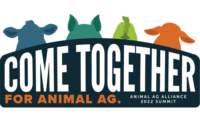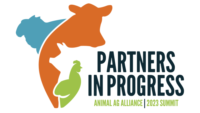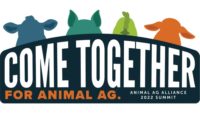The Animal Agriculture Alliance hosted its annual Stakeholders Summit in Kanas City, Mo., earlier this summer. The event, themed “A Seat At The Table,” brought together 335 food and agriculture stakeholders to discuss sustainability, consumer perceptions, engaging influencers, labels and much more. Here are my top takeaways for anyone in the animal agriculture or meat business:
1. The public often prefers ads and messages emphasizing the brand’s or company’s values rather than why its product is superior to others. Product marketing should connect with the consumers’ emotional “why,” not just talk about the product.
Anne-Marie Roerink, principal at 210 Analytics, led a consumer focus group with six Kansas City-area consumers. The focus group participants were asked about their meat-purchasing habits, animal welfare and antibiotics. After being shown two cheese commercials, the panelists favored the Sargento commercial talking about the company’s values over the Kraft commercial talking about its cheese not using milk from cows treated with r-BST.
Bill Gutrich, director of global food industry engagement at Elanco Animal Health, echoed this during his presentation on the power of positive marketing saying, “Great marketing talks about the consumers connecting to that emotional ‘why.’ Good marketing talks about the buyer, not the product.”
2. Protein alternatives are highly processed and animal agriculture has the competitive edge with minimally processed, quality protein. Protein alternatives, including plant-based proteins and cell-cultured meats are a hot topic. Christine McCracken, executive director of animal protein at Rabobank, recommended everyone in animal agriculture and the meat industry be up to date and read about these alternative protein options because they are in competition with traditional meat. McCracken also assured attendees that animal agriculture has the competitive edge with a natural, minimally processed protein.
3. There needs to be a labeling program for meat and poultry that cuts through confusion and recognizes the health of animals, people and the planet are linked. G. Donald Ritter, DVM and director of technical marketing at Mountaire Farms, presented the new One Health Certified program, which “is a new multi-protein consumer choice program that takes care of animals and addresses important issues in animal agriculture in a responsible and sustainable way.” Ritter called the program a “triple win” and expects the certification to be available sometime this summer.
4. Transparency is paramount for sustainability. On a panel about industry-led beef supply chain animal welfare and sustainability efforts, Justin Nelson, vice president of cattle procurement at Tyson Foods, said, “At the end of the day, it’s about what the consumer wants. We also need to educate because there is a lot of fiction in the world today. We need to do a better job educating consumers about what things mean.”
5. Influencer engagement provides third-party validation for companies. Meat companies should partner with influencers (bloggers, for example) to tour their facilities and offer a “third-party validation” for the company. Influencers can help increase awareness and confidence in the meat processing industry. “The power of influencers is huge and will continue to grow,” said Hana Bieliauskas, digital practice lead at Inspire PR Group. She added that influencer engagement is a “third-party validation to the information being shared.”
6. Independent audits matter to build confidence. In addition to giving influencers the opportunity to give your company a third-party validation, meat processing companies should also consider incorporating independent, third-party animal welfare audits to increase confidence and brand power, especially when your company is facing scrutiny. Ruth Woiwode, PhD, manager of livestock audit services at Food Safety Net Services, told attendees that “what people care about is the process by which we respond, that there that there is a process and that drives trust.”
7. Restaurants and retailers are feeling pressure from activist groups about sourcing and rely on their suppliers to help them meet policy deadlines. Leaders from Publix, Sodexo and Centralized Supply Chain Services shared their perspectives on making policy announcements, explaining that they receive immense pressure from animal rights activist groups and sometimes make announcements before talking with their suppliers. Companies shouldn’t wait to be called upon and instead have established engaging relationships with others in their supply chain.
8. Stop referring to consumers as a large, monolithic group and start talking to individuals. Kim Kirchherr, registered dietitian and supermarket consultant, should have kicked off the Summit with this advice! Kirchherr stated “relationships make facts make sense” and recommended having a more personal connection with your customers.
9. Companies should make themselves hard targets for animal rights activists. A company can make themselves a “soft target” or a “hard target” for activist groups, according to Jim Rovers, senior vice president at AFIMac. To make your company a hard target and less likely to experience activist activity, have alarm systems, cameras, access controls, fencing, signage and a vendor selection/screening process.
10. Blockchain technology can help with provenance, traceability, trust and efficiency in animal agriculture. Blockchain technology is receiving a lot of buzz, but Andy Brudtkuhl, director of emerging technology at National Pork Board, said “they’re not anything fancy, they’re just encrypted data. In most cases blockchain is not going to solve your problem, but there are specific cases where it can help.”
11. The animal agriculture industry must be united because adversaries want to divide the industry.
To wrap up the Summit, Andy Curliss, president at North Carolina Pork Council, explained how pork producers in his state are facing nuisance lawsuits brought forth by activist groups, which “puts a lot of people out of business and takes a lot of food off the table.” Curliss urged attendees to remain united across protein sectors for the sake of the animal agriculture industry.
Recorded presentations from the Summit can be viewed at https://agtoday.us/2019-aaa-summit.
I hope you’ll consider joining us next year in Arlington, Va. NP





Report Abusive Comment